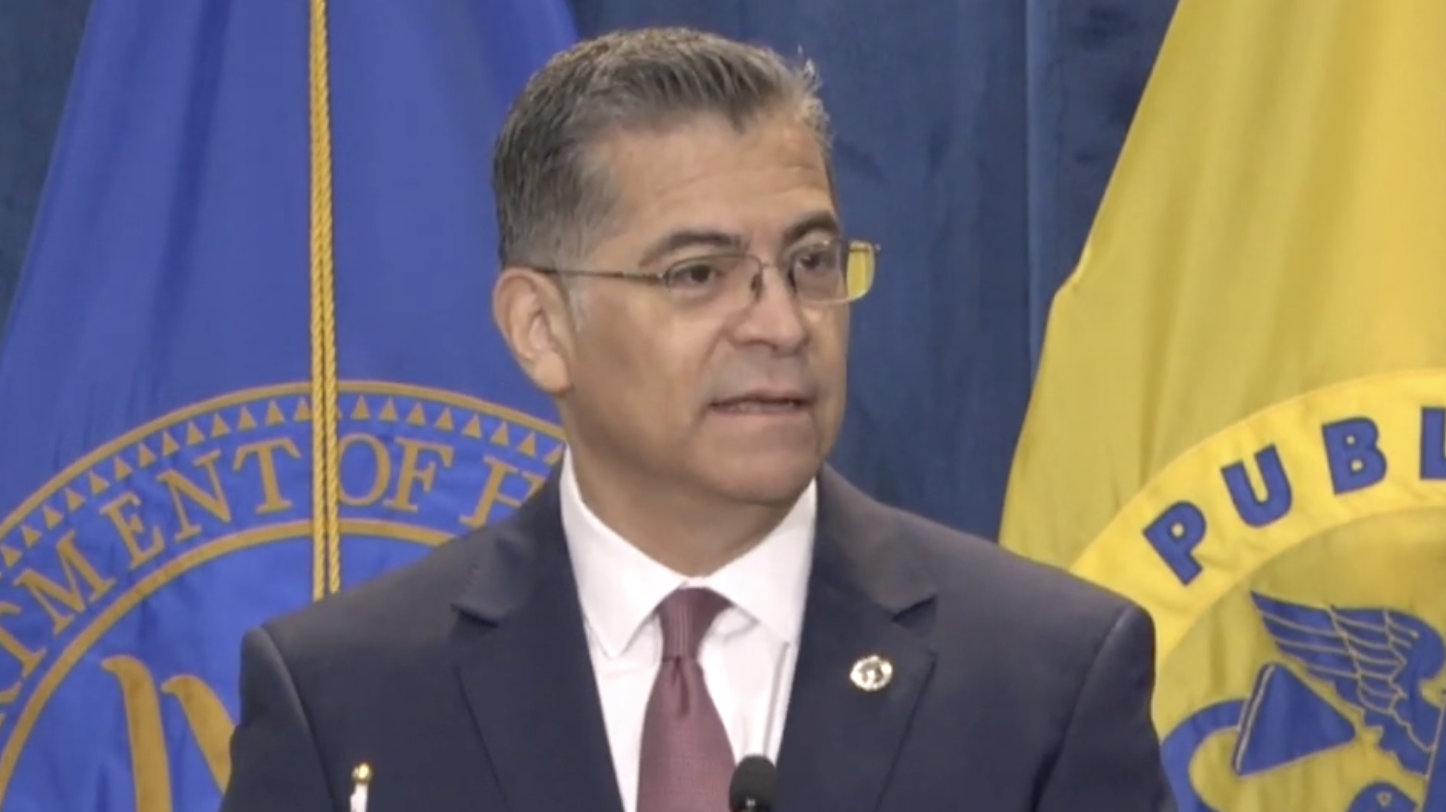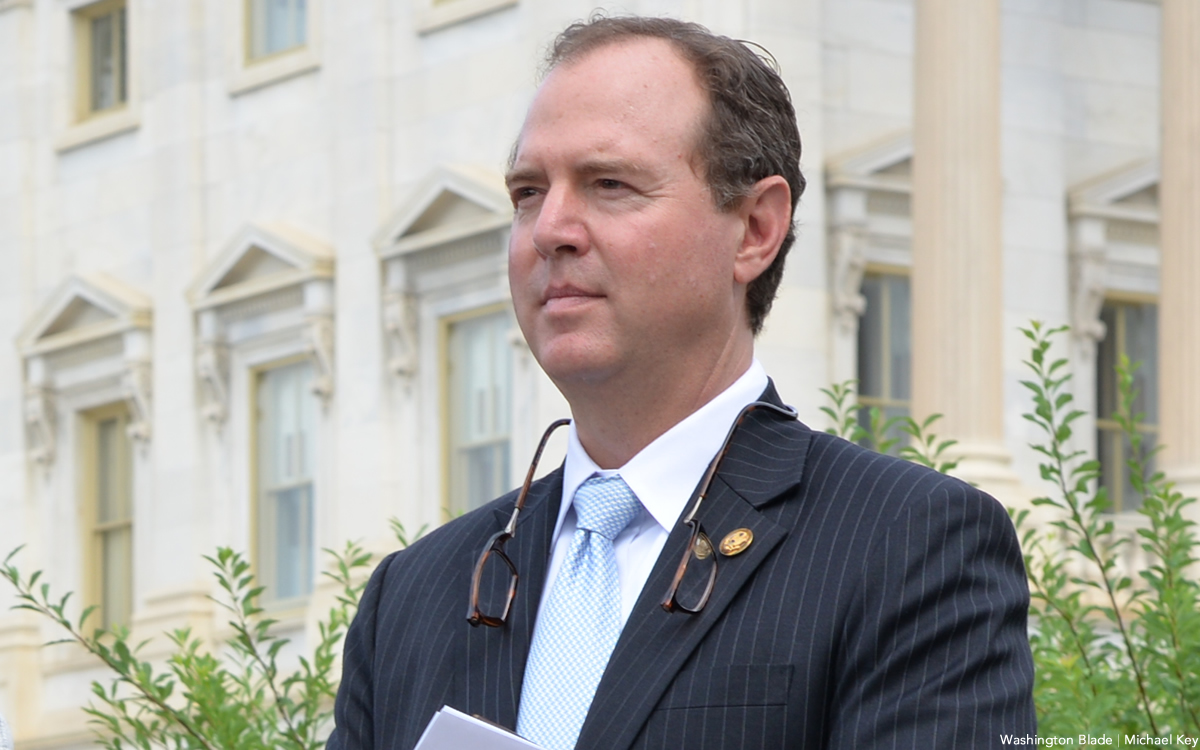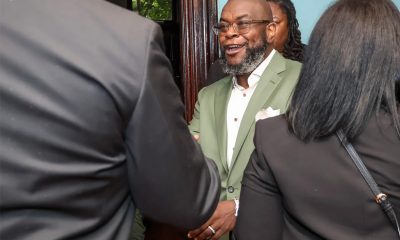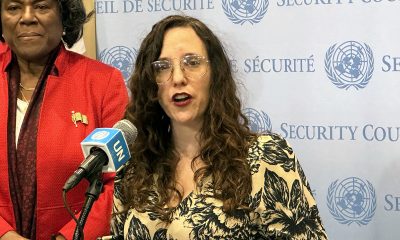Federal Government
New HHS smoking cessation framework is focused on ‘most vulnerable’ populations
Smoking rates are higher for LGBTQ youth and adults

The U.S. Department of Health and Human Services introduced a new 28-page Framework to Support and Accelerate Smoking Cessation on Friday, an effort to support the Biden-Harris administration’s Cancer Moonshot, which aims to cut cancer-related deaths by at least 50 percent over 25 years.
“This framework focuses on advancing equity, engaging communities, and coordinating, collaborating, and integrating evidence-based approaches across every facet of our government and society,” HHS Secretary Xavier Becerra said in a press release.
“The Biden-Harris Administration will continue these efforts,” he said, “until smoking is no longer the leading cause of preventable death in the United States, and the communities that remain the most vulnerable get the help they need.”
The department’s assistant secretary for health, Adm. Rachel Levine, said, “Today’s announcement marks an important milestone reaffirming our commitment to helping people who smoke to quit by working to maximize their access to and awareness of evidence-based interventions and programs.”
According to the Centers for Disease Control and Prevention, which is a division of HHS, about 15.3 percent of lesbian, gay, and bisexual adults smoke cigarettes, a figure that is “much higher” than the 11.4 percent of heterosexual adults who do. Lesbian, gay, and bisexual middle and high school aged youth are also likelier to smoke than their straight counterparts.
Additionally, a 2017 study in the American Journal of Preventative Medicine found that 39.7 percent of transgender adults reported using cigarettes, cigars, or e-cigarette products in the last 30 days, and use of e-cigarettes is four times higher compared to use by cisgender adults.
As a result, the CDC reports that LGBTQ people “have more risk factors for cardiovascular (heart and blood vessel) disease – like high blood pressure – than straight adults.”
The agency warns that “if you are part of the LGBTQ+ community, you likely have seen tobacco ads in magazines, newspapers, and websites directed at you” because “Tobacco companies are focusing their advertising on your communities.”
Evidence suggests LGBTQ smokers may also be less likely to call tobacco quitlines, and fewer are using counseling or smoking-cessation medications.
HHS’s framework document also notes the disparities in cigarette smoking among LGBTQ adults, along with other populations who are likelier to smoke including Black men, blue collar or service industry workers, and adults living in rural areas.
The authors also highlight, in a list of existing HHS programs and activities for smoking cessation, the CDC’s National Networks Driving Action: Preventing Tobacco- and Cancer-Related Health Disparities by Building Equitable Communities.
The program “funds a consortium of national networks to advance the prevention of commercial tobacco use and cancer in populations experiencing tobacco- and cancer-related health disparities” and lists LGBTQ people among the “focus population groups.”
According to the HHS press release, “The Framework is organized around six goals that serve as a foundation for long-standing HHS efforts to support and promote smoking cessation”:
- Reduce smoking- and cessation-related disparities.
- Increase awareness and knowledge related to smoking and cessation.
- Strengthen, expand, and sustain cessation services and supports.
- Increase access to and coverage of comprehensive, evidence-based cessation treatment.
- Advance, expand, and sustain surveillance and strengthen performance measurement and evaluation.
- Promote ongoing and innovative research to support and accelerate smoking cessation.
Federal Government
Mass HHS layoffs include HIV/AIDS prevention, policy teams
Democratic states sue over cuts

Tuesday began a series of mass layoffs targeting staff, departments, and whole agencies within the U.S. Department of Health and Human Services under Secretary Robert F. Kennedy Jr., who reportedly plans to cut a total of 10,000 jobs.
On the chopping block, according to reports this week, is the Office of Infectious Disease and HIV/AIDS Policy. A fact sheet explaining on the restructuring says “a new Administration for a Healthy America (AHA) will consolidate the OASH, HRSA, SAMHSA, ATSDR, and NIOSH, so as to more efficiently coordinate chronic care and disease prevention programs and harmonize health resources to low-income Americans.”
The document indicates that “Divisions of AHA include Primary Care, Maternal and Child Health, Mental Health, Environmental Health, HIV/AIDS, and Workforce, with support of the U.S. Surgeon General and Policy team.”
“Today, the Trump administration eliminated the staff of several CDC HIV prevention offices, including entire offices conducting public health communication campaigns, modeling and behavioral surveillance, capacity building, and non-lab research,” said a press release Tuesday by the HIV + Hepatitis Policy Institute.
The organization also noted the “reassignments” of Jonathan Mermin, director of the National Center for HIV, Viral Hepatitis, STD, and TB Prevention, and Jeanne Marrazzo, director of the National Institutes of Health’s National Institute of Allergy and Infectious Diseases. Both were moved to the Indian Health Service.
“In a matter of just a couple days, we are losing our nation’s ability to prevent HIV,” said HIV + Hepatitis Policy Institute Executive Director Carl Schmid. “The expertise of the staff, along with their decades of leadership, has now been destroyed and cannot be replaced. We will feel the impacts of these decisions for years to come and it will certainly, sadly, translate into an increase in new HIV infections and higher medical costs.”
The group added, “We are still learning the full extent of the staff cuts and do not know how the administration’s announced reorganization of HHS will impact all HIV treatment, prevention, and research programs, including President Trump’s Ending the HIV Epidemic initiative,” but “At the moment, it seems that we are in the middle of a hurricane and just waiting for the next shoe to drop.”
A group of 500 HIV advocates announced a rally planned for Wednesday morning at 8 a.m., at the U.S. Capitol lawn across from the Cannon House Office Building, which aims to urge Congress to help stop the cuts at HHS.
“Over 500 advocates will rally on Capitol Hill and meet with members of Congress and Hill staff to advocate for maintaining a strong HIV response and detail the potential impact of cuts to and reorganization of HIV prevention and treatment programs,” the groups wrote.
The press release continued, “HHS has stated that it is seeking to cut 10,000 employees, among them 2,400 CDC employees, many doing critical HIV work. It also seeks to merge HIV treatment programming into a new agency raising concerns about maintaining resources for and achieving the outstanding outcomes of the Ryan White HIV/AIDS Program.”
On Tuesday a group of Democratic governors and attorneys general from 23 states and D.C. filed a lawsuit against HHS and Kennedy seeking a temporary restraining order and injunctive relief to halt the funding cuts.
U.S. Centers for Disease Control and Prevention withdrew approximately $11.4 billion in funding for state and community health departments during the COVID-19 pandemic response, along with $1 billion to the Substance Abuse and Mental Health Services Administration.
“Slashing this funding now will reverse our progress on the opioid crisis, throw our mental health systems into chaos, and leave hospitals struggling to care for patients,” New York Attorney General Letitia James said.
Federal Government
Trump ‘culture war’ complicates HUD’s distribution of $3.6B in housing grants
Senate Dems call for new agreements

The disbursement of more than $3.6 billion in federal grants to housing providers has been paused for weeks while the U.S. Department of Housing and Urban Development seeks to condition receipt of the funding on compliance with President Donald Trump’s executive actions targeting DEI and transgender and immigrant communities.
March 4 was the statutory deadline for the agency to distribute the funds, which come through the Continuum of Care Program in support of local governments and nonprofit organizations working to promote “a community-wide commitment to the goal of ending homelessness.”
On March 13, a group of Senate Democrats led by U.S. Sens. Adam Schiff (Calif.) and Tina Smith (Minn.) wrote to HUD Secretary Scott Turner urging him to move quickly on distributing the grants and warning of the consequences that recipients are now facing and the harm they will encounter in the future if delays persist.
“To keep the lights on, providers are now being forced to draw on lines of credit at significant cost and risk to their organizations,” the senators said. “These projects enable homeless service providers to help veterans, families with children, youth, seniors, and vulnerable individuals access permanent and temporary housing, crisis counseling, and other supportive services.”
HUD subsequently disseminated grant agreements — and Schiff published an example on his office’s website — that included, among other provisions, language stipulating that the awardee (1) “shall not use grant funds to promote ‘gender ideology,’ as defined in E.O. 14168, Defending Women from Gender Ideology Extremism and Restoring Biological Truth to the Federal Government,” (2) certifies that it does not operate any programs promoting diversity, equity, and inclusion that violate any applicable Federal anti-discrimination laws, and (3) agrees not to use “that funding in a manner that by design or effect facilitates the subsidization or promotion of illegal immigration or abets so-called ‘sanctuary’ policies that seek to shield illegal aliens from deportation.”
On March 14, the 4th U.S. Court of Appeals stayed a nationwide injunction enjoining three parts of Trump’s executive order on DEI, and the following day, HUD rescinded the CoC contracts and said to expect new agreements within a week as the agency was “working to revise its CoC grant agreements to be consistent with Federal law and compliant with applicable court orders.”
Schiff then led a second letter to Turner on March 19 with the Senate Democratic Leader Chuck Schumer (N.Y.) and U.S. Sens. Alex Padilla (D-Calif.), Martin Heinrich (D-N.M.), Ron Wyden (D-Ore.), Mazie Hirono (D- Hawaii), and Richard Blumenthal (Conn.).
“We urge the department to immediately issue new CoC grant agreements consistent with longstanding practice— free of the aforementioned conditions— to ensure all individuals experiencing homelessness receive protection and support, regardless of gender identity, location, or other characteristics,” they said, requesting a response by March 31.
“The initial FY2024 grant agreements issued to CoC funding recipients contained new requirements that are deeply problematic, and likely unlawful, requirements,” the senators argued. “These mandates, such as barring shelters from serving transgender people, prohibiting DEI initiatives, and certifying that they do not support ‘sanctuary’ policies protecting noncitizens, conflict with federal civil rights, fair housing, and immigration laws, raising serious legal and constitutional concerns.”
The lawmakers noted “the harm caused by these delayed and unfulfilled CoC grant agreements will fall disproportionately on our most vulnerable populations, including women, families with children, youth, veterans, survivors of domestic and intimate partner violence, people with disabilities, and LGBTQ+ individuals.” They added, “Women experiencing homelessness — many of whom are fleeing domestic abuse — already face significant barriers to safety and stability, and restricting access to critical housing services will only further endanger their lives and well-being.”
Citing research that nearly one in three transgender Americans has experiences homelessness in their lives, Schiff and his colleagues stressed that “Transgender and nonbinary people in the U.S. face significant barriers to securing safe housing, with many experiencing homelessness and high rates of mistreatment and violence in shelters.”
With respect to the language in the agreements about “sanctuary” policies, the senators wrote “The organizations receiving CoC funds exist to provide critical, non-discriminatory aid to those in need, regardless of their immigration status. These organizations do not set or enforce immigration policy — they simply fulfill their legal duty to provide life-saving and life-changing care.”
Later on March 19, HUD began issuing new contracts that did not contain the provision concerning DEI but did include the same language about “gender ideology” and “sanctuary” policies.
Federal Government
RFK Jr. debuts anti-trans webpage, public guidance at HHS
Agency advances Trump’s anti-trans executive orders

On Wednesday, less than a week after Robert F. Kennedy Jr. was confirmed as secretary of the U.S. Department of Health and Human Services, the agency rolled out a webpage promoting the Trump administration’s anti-trans executive orders and issued a public guidance asserting that a person’s sex is “unchangeable.”
The webpage for HHS’s Office on Women’s Health highlights President Donald Trump’s executive actions defining sex in a manner that excludes transgender, nonbinary, and intersex populations, prohibiting trans women and girls from participating in competitive sports, and restricting people younger than 19 from accessing medically necessary gender affirming healthcare interventions.
“This administration is bringing back common sense and restoring biological truth to the federal government,” Kennedy said in a statement announcing the guidance and the new HHS page. “The prior administration’s policy of trying to engineer gender ideology into every aspect of public life is over.”
The webpage is headlined by a video featuring Riley Gaines, the former NCAA swimmer-turned-right-wing, anti-trans activist. “The executive order keeping men out of women’s sports ensures the next generation of girls has the fair opportunity to compete with the safety, privacy, and equal opportunity they’re entitled to,” she said in the clip.
The Trump-Vance administration’s narrow definition of sex and position that gender affirming care for minors constitutes “child abuse” is disputed not just by the health officials serving under the Biden-Harris administration, but also by the mainstream scientific and medical community.
Multiple federal judges have also weighed in. During a hearing on Tuesday challenging Trump’s efforts to bar trans people from serving in the military, Judge Ana Reyes of the U.S. District Court for the District of Columbia said the White House’s assertion that gender is an immutable trait determined only by birth sex was not “biologically correct.”
“There are anywhere near 30 intersex examples,” she said. “Anyone who doesn’t have XX or XY chromosomes is not just male or female, they’re intersex.”
Additionally, last week, two federal judges issued orders temporarily blocking the enforcement of Trump’s executive order restricting medical interventions for transgender youth.
-

 National2 days ago
National2 days agoDestination Tomorrow works to empower LGBTQ community
-

 Maryland2 days ago
Maryland2 days agoAt transgender visibility celebration, Moore called out for lack of action
-

 Arts & Entertainment2 days ago
Arts & Entertainment2 days ago‘Think of those who have not been seen,’ Cynthia Erivo’s powerful message at GLAAD Awards
-

 Opinions4 days ago
Opinions4 days agoHelping your company to be inclusive during hard times











